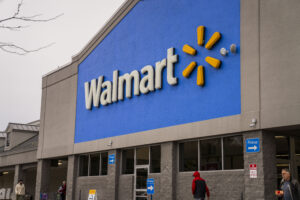<p class="canvas-atom canvas-text Mb(1.0em) Mb(0)–sm Mt(0.8em)–sm" type="text" content="Until recently, the digital ad market was effectively a duopoly, controlled by Alphabet subsidiary Google and social-media giant Facebook. Those dynamics have begun to change as government regulators around the world have pushed for greater privacy protections, and with the emergence of Amazon.com (NASDAQ: AMZN) as a growing player in the digital ad segment.” data-reactid=”11″>Until recently, the digital ad market was effectively a duopoly, controlled by Alphabet subsidiary Google and social-media giant Facebook. Those dynamics have begun to change as government regulators around the world have pushed for greater privacy protections, and with the emergence of Amazon.com (NASDAQ: AMZN) as a growing player in the digital ad segment.
<p class="canvas-atom canvas-text Mb(1.0em) Mb(0)–sm Mt(0.8em)–sm" type="text" content="Now, the game is changing even more, with the revelation that Amazon will now allow advertisers to use third-party ad-buying platforms — including The Trade Desk (NASDAQ: TTD) — to buy ads on Amazon Fire TV devices.” data-reactid=”12″>Now, the game is changing even more, with the revelation that Amazon will now allow advertisers to use third-party ad-buying platforms — including The Trade Desk (NASDAQ: TTD) — to buy ads on Amazon Fire TV devices.


Image source: Getty Images.
A big development
For investors who aren’t involved in the advertising industry: This represents a massive policy shift by Amazon. Until recently, if advertisers wanted to place ads in front of customers using the Fire TV or the Fire TV Stick, they had to deal directly with Amazon and its walled-garden approach. Now, ad agencies and their advertisers will be able to use The Trade Desk or privately held DataXu to place ads directly to the Fire TV platform.
<p class="canvas-atom canvas-text Mb(1.0em) Mb(0)–sm Mt(0.8em)–sm" type="text" content="The Trade Desk CEO Jeff Green recently addressed the news, calling it a "game changer" during the company's second-quarter conference call. He also said it was "one of, if not the most significant deal" The Trade Desk has done in connected television to date. Here’s why.” data-reactid=”27″>The Trade Desk CEO Jeff Green recently addressed the news, calling it a “game changer” during the company’s second-quarter conference call. He also said it was “one of, if not the most significant deal” The Trade Desk has done in connected television to date. Here’s why.
<p class="canvas-atom canvas-text Mb(1.0em) Mb(0)–sm Mt(0.8em)–sm" type="text" content="Advertisers will be able to place advertising with 100% of the third-party content providers that have apps on the Amazon Fire TV platform — like the Discovery, NBC, and ESPN apps — which were previously off limits unless you went directly through Amazon Publishing Services, the company’s advertising arm. Amazon will supply an anonymized ID that will help advertisers measure reach and frequency of their ads "across the entire internet," according to Green. More importantly, it will help "drive ad relevance across the TV ecosystem."” data-reactid=”28″>Advertisers will be able to place advertising with 100% of the third-party content providers that have apps on the Amazon Fire TV platform — like the Discovery, NBC, and ESPN apps — which were previously off limits unless you went directly through Amazon Publishing Services, the company’s advertising arm. Amazon will supply an anonymized ID that will help advertisers measure reach and frequency of their ads “across the entire internet,” according to Green. More importantly, it will help “drive ad relevance across the TV ecosystem.”
It’s important to note that the deal has its limitations. Amazon is not providing access to customer shopping data, as this would represent a significant risk to data security.
The regulatory environment
<p class="canvas-atom canvas-text Mb(1.0em) Mb(0)–sm Mt(0.8em)–sm" type="text" content="In recent months, there has been a dramatic shift on the part of U.S. regulators and their focus on big tech. Amazon, Facebook, and Google have all found themselves in the crosshairs of antitrust interest from the Federal Trade Commission and the Department of Justice.” data-reactid=”31″>In recent months, there has been a dramatic shift on the part of U.S. regulators and their focus on big tech. Amazon, Facebook, and Google have all found themselves in the crosshairs of antitrust interest from the Federal Trade Commission and the Department of Justice.
Much of this focus is the result of how big tech companies manage the consumer data they’ve accumulated, and how that data is used to target advertising.
Amazon’s decision is a “victory for the open internet,” according to Green, because Amazon is partnering with outside agencies and becoming more transparent about its fee structure than it has in the past. This move will likely put pressure on other big tech companies and connected-TV aggregators to follow suit.


Image source: The Trade Desk.
The Trade Desk reaps the rewards
<p class="canvas-atom canvas-text Mb(1.0em) Mb(0)–sm Mt(0.8em)–sm" type="text" content="Programmatic advertising has become big business. While the worldwide ad market is expected to grow by just 4% year over year in 2019, digital advertising is expected to grow about 18%, while comprising about half of the global ad market, according to eMarketer. Programmatic — which is The Trade Desk's bread and butter — is the fastest-growing component of digital advertising, growing at about 20% year over year. The Trade Desk is growing even faster, with revenue that grew 42% year over year in its most recent quarter, while spending on connected-TV ads grew 250% year over year.” data-reactid=”51″>Programmatic advertising has become big business. While the worldwide ad market is expected to grow by just 4% year over year in 2019, digital advertising is expected to grow about 18%, while comprising about half of the global ad market, according to eMarketer. Programmatic — which is The Trade Desk’s bread and butter — is the fastest-growing component of digital advertising, growing at about 20% year over year. The Trade Desk is growing even faster, with revenue that grew 42% year over year in its most recent quarter, while spending on connected-TV ads grew 250% year over year.
The Trade Desk has long maintained that most advertising will be digital, and nearly all of that will be transacted programmatically. By bringing Amazon into the fold, it increases the amount of programmatic advertising that will be transacted on connected TVs, giving The Trade Desk’s business a big boost in the process.
<p class="canvas-atom canvas-text Mb(1.0em) Mb(0)–sm Mt(0.8em)–sm" type="text" content="John Mackey, CEO of Whole Foods Market, an Amazon subsidiary, is a member of The Motley Fool’s board of directors. Suzanne Frey, an executive at Alphabet, is a member of The Motley Fool’s board of directors. Randi Zuckerberg, a former director of market development and spokeswoman for Facebook and sister to its CEO, Mark Zuckerberg, is a member of The Motley Fool’s board of directors.” data-reactid=”54″>John Mackey, CEO of Whole Foods Market, an Amazon subsidiary, is a member of The Motley Fool’s board of directors. Suzanne Frey, an executive at Alphabet, is a member of The Motley Fool’s board of directors. Randi Zuckerberg, a former director of market development and spokeswoman for Facebook and sister to its CEO, Mark Zuckerberg, is a member of The Motley Fool’s board of directors.
<p class="canvas-atom canvas-text Mb(1.0em) Mb(0)–sm Mt(0.8em)–sm" type="text" content=" Danny Vena owns shares of GOOGL, Amazon, FB, The Trade Desk, and DIS and has the following options: long January 2021 $85 calls on DIS. The Motley Fool owns shares of and recommends GOOGL, GOOG, Amazon, DISCK, FB, The Trade Desk, and DIS. The Motley Fool has the following options: long January 2021 $60 calls on DIS, short January 2020 $125 calls on The Trade Desk, long January 2020 $60 calls on The Trade Desk, and short October 2019 $125 calls on DIS. The Motley Fool has a disclosure policy.” data-reactid=”55″> Danny Vena owns shares of GOOGL, Amazon, FB, The Trade Desk, and DIS and has the following options: long January 2021 $85 calls on DIS. The Motley Fool owns shares of and recommends GOOGL, GOOG, Amazon, DISCK, FB, The Trade Desk, and DIS. The Motley Fool has the following options: long January 2021 $60 calls on DIS, short January 2020 $125 calls on The Trade Desk, long January 2020 $60 calls on The Trade Desk, and short October 2019 $125 calls on DIS. The Motley Fool has a disclosure policy.
<p class="canvas-atom canvas-text Mb(1.0em) Mb(0)–sm Mt(0.8em)–sm" type="text" content="This article was originally published on Fool.com” data-reactid=”56″>This article was originally published on Fool.com








